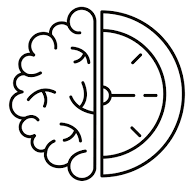The circadian rhythm is an internal clock on which your body runs. It’s the physical, mental and behavioral patterns we make. It’s affected by factors such as one’s food intake, environment lighting, stress, physical activities, social environment and temperature. Almost every living thing has this internal clock, ranging from humans and animals to plants and microorganisms.
Each organ in the body has its own version of a circadian rhythm, tuned to the cycle of day and night. It’s this rhythm that helps us wake up at the same time everyday, and it can be greatly affected by travel, work or other underlying issues despite your body having it naturally aligned. Students can find themselves experiencing this unalignment while on breaks from school because there is not a firm time get up which can lead to going to bed at a inconsistent time, so things can easily get off balance. It can be much harder to get back on schedule than it is to get off it.
“It was weird, even waking up for the late start day was a lot,” said Freshman Regulus Martinez, “I did a lot of theater till 7 or 9 p.m., so I’d get home late and wouldn’t have an alarm set…I’d sleep in between 10 and 12.” Martinez had a severe off balance circadian rhythm because of how they‘re sleep schedule was, but that’s not the only way people offset their rhythm.
“Sleeping too much, sleeping not enough, or trying to be active at a time your body isn’t ready to be active are all reasons why your could be off…
when you’re offset it can be incredibly difficult to focus on everyday activities,” health teacher Drew Halvorson says. “Your body has awake time and sleep time, so if you mess that up you won’t be at peak efficiency. It’s like walking through fog.”
Not only can your circadian rhythm affect your focus and attention span, but the rest of your body too. “Things like digestion change your response to stimuli, and depending on your hormones, decrease hormone production,” health occupations teacher Molly Morse said.
All of these are side effects of an offset circadian rhythm, but what else can correlate? Common sleep disorders such as insomnia can sometimes be the cause or an effect of an off set circadian. It’s important to note that one does not cause the other, but they can go hand in hand. “It’s less of a one causes the other and more of a correlation and causation,” Halvorson said.
Having any kind of sleeping disorder is difficult and can make an offset circadian much worse. Having an off balance is “like you’re constantly overstimulated because you can’t relax,” Morse said. “You’re often irritable and have a low tolerance for stressful environments.”
A way to keep your internal clock on track is by keeping yourself aware of the issue. knowing what messes you up. Martinez has already taken steps to fix their sleeping patterns because of this self awareness, saying “I’m trying not to stay up really late because it really messes with me.”
Removing distractions and screen time can be especially helpful when trying to manage your sleep cycle. Halvorson said “make sure it’s a comfortable environment, it’s quiet, remove distractions, remove screen time, blue light, glowing screens, all that kind of stuff,” it’s commonly recommended to get off your electronics 30 minutes before going to bed. Other ways to get back on your body’s cycle is “going to sleep earlier, and waking up earlier,” said by both Halvorson and Morse.


